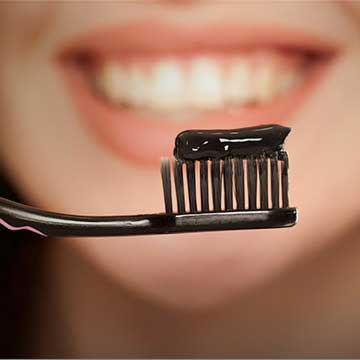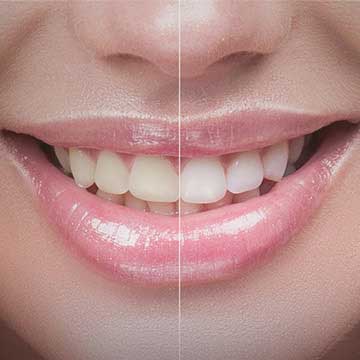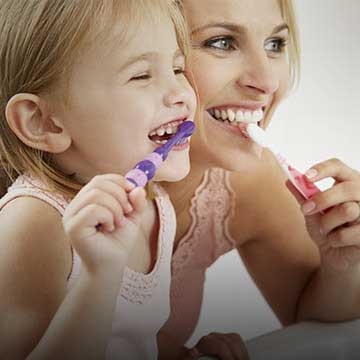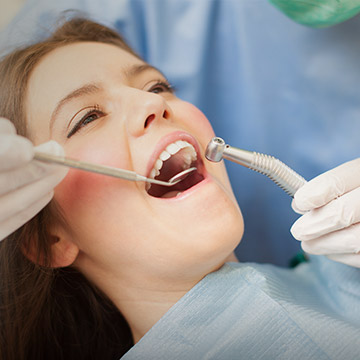Recommendations to Maintain Oral Health
- Most patients should have X-rays to check for gum disease and cavities every 12 months.
- Cleaning at least every six months (some patients benefit from 3-4 months)
- Brushing twice per day and flossing once daily or using a Waterpik
- Use a fluoride toothpaste. Some people benefit from high-fluoride toothpaste if they are prone to cavities. You can discuss this with your dentist.
- If you are considering another pregnancy, talk to your dentist about taking your x-rays early if necessary for family planning.
Pregnancy Considerations
- Elective dental treatment with local anesthetic (freezing) can be completed in the second trimester. However, it can be uncomfortable to lie in a dental chair when pregnant, so we recommend having dental work completed before trying to become pregnant.
- Pregnancy Gingivitis: Bleeding gums and mouth bacterial levels peak in the second trimester. Good news! Research suggests that bacteria and bleeding caused by pregnancy do not result in bone loss around the teeth. If you have gum disease before pregnancy, it can continue to cause loss of bone support to the teeth during and after pregnancy.
- Nausea can make it more challenging to complete oral care during pregnancy, increasing plaque and tartar build-up around the teeth. After delivery, it is essential to have a dental exam with x-rays and a cleaning.
Postpartum
- With a young baby at home, habits can change, negatively impacting oral health.
Examples include snacking during nighttime feeds and skipping brushing or flossing. Finding time for self-care can be challenging. You can set alarms or alerts to remind yourself to brush and floss twice daily. If you eat at night and can’t brush, try rinsing your mouth with water.
- How postpartum stress and anxiety can affect oral health: Depression and anxiety can affect oral health in many ways. Self-care can become very challenging when a new baby comes. If you have difficulty with self-care, please talk to your physician or someone you trust.
- SSRIs are a type of medication that is commonly prescribed for anxiety and depression. SSRIs can increase clenching and grinding for some patients. In many patients, the increased clenching will resolve with time. Speak with your dentist if you have noticed any changes in jaw symptoms after starting a new medication.
- Women of childbearing age are most affected by TMJ disorders and headaches or migraines. Lack of sleep and stress or anxiety can precipitate jaw pain and headaches. Speak with your dentist about a night guard or other treatment options for TMD.
When Will My Baby Get Their First Tooth?
- The first tooth to come into the mouth is usually the lower central incisor between 6 and 10 months. This is an average; many infants have teeth earlier or later than 6 to 10 months. If your child is 18 months old and has no erupted teeth, consult your dentist. The order of tooth eruption varies between children. Most often, the incisors erupt first, followed by the first molars, canines, and second molars. The bottom jaw is usually ahead of the top jaw.
Common Symptoms of Teething
- Increased salivation
- Irritability
- Chewing on hands or objects
- Redness or rash on the cheeks or around the mouth
Myths About Teething
- Teething occurs at the same time as many other developmental milestones. Irritability, mouthing objects, and fever are often attributed to teething when it is caused by something else. Teething can cause a slight elevation in body temperature but does not cause an actual fever. If your infant has a true fever, diarrhea, or rash that appears outside of the lips or cheeks, consult with your baby’s physician. It is usual for babies to mouth objects as a form of exploration. Chewing on hands and objects does not mean they are teething.
Recommended Treatments Include
- Teethers: Cold or one-piece food-grade silicone. Be cautious of teethers filled with fluid, as they can rupture if damaged.
- Partially frozen wet cloth be sure it is softened slightly and is not too cold.
- Massage the gums with a cloth or soft brush.
- If needed, give your baby an over-the-counter pain reliever. Use a pain reliever for your baby’s specific age. Read and follow all instructions on the label. If you are unsure what pain relief is safe for your baby or if they have a medical condition, please speak with your physician.
Not Recommended
- Teething necklaces are a strangulation risk, and there is no scientific evidence that they are effective.
- Orajel (benzocaine) can be absorbed quickly by the body and result in a condition called methemoglobinemia. Its use is not recommended in infants or children.
Cleaning Your Baby’s Mouth Before They Have Teeth
- It is beneficial to clean your baby’s gums before they have teeth. You can wipe the gums with a clean washcloth daily to get them used to oral care.
- Candidiasis or thrush can develop in the infant’s mouth if the mom or baby is prone to it. It can be transferred between the mom’s breast and the baby’s mouth. If it occurs, the baby and mom need to be treated. Signs of thrush may include red or white patches in the mouth.
How Do I Clean My Baby’s Teeth?
- Use a finger toothbrush or small kids’ toothbrush with water. Starting at 12 months, use a grain of rice amount of regular fluoride toothpaste. Once your child can spit and is three years old, use a pea-sized amount.
When Do I Need to Floss My Baby’s Teeth?
- Once teeth are next to each other touch, they must be flossed to prevent cavities between them. Decay between teeth, called interproximal decay, can’t be detected by the naked eye until it is substantial and likely to cause a toothache.
- Floss sticks work well to start flossing your child’s teeth.
- As kids age, we recommend that adults assist with oral care until they can reliably tie their shoes. Some children require help until they are 10-12 years old.
- Allow kids to brush and floss first; an adult can do it afterward to ensure it is done effectively.
When Should My Baby Have Their First Dental Appointment?
- The standard recommendation is to make an appointment within six months of your child’s first tooth erupting into the mouth. The first appointment is primarily for parent education. If the child is cooperative, a dental exam can be done. Often, it takes a visit or two before a child feels comfortable.
- Alberta Health Services provides fluoride varnish for preschool-age kids. Contact your nearest public health center for details.
What Do I Do If My Child Falls and Hits Their Mouth?
- With any head or facial trauma, it is essential to assess the child for head injury. If your child is abnormally lethargic or not settling after a fall, please get in touch with your physician or seek emergency medical care.
- Never attempt to replant a baby tooth that is knocked out back into the mouth.
- Contact your dentist to have the child evaluated.
Thumb Sucking
- Thumb sucking can affect the shape of the palate and jaws, resulting in incorrect tongue posture and impairing the development of a stable bite. Unfavorable jaw development can result in speech delays and negatively impact the correct eruption of the adult teeth. Correcting the habit is only possible once children are old enough to communicate well. We recommend trying a reward or sticker chart for preschool-age children.
Bottles and Cups
- If your infant with teeth is feeding at night, best efforts should be made to wipe the teeth after feeds with a cloth. Bottle feeding results in more pooling of milk or formula and can result in tooth decay. The mouth posture and sucking motion with breastfeeding results in less pooling around the teeth but can still feed cavity bacteria. If your child is nursing at night, cleaning teeth with a cloth after feeding is ideal.
- At 12 months of age, it is recommended that babies transition from bottle to open cup. From a practical standpoint, if a cup with a lid is needed to prevent spills, straw cups are recommended over conventional “sippy” cups. Any cup with a valve that requires a child to suck can create an unfavorable mouth posture. You can test cups yourself. If drawing liquid through the straw is challenging, try a different cup. You can cut valves out of cups to allow more effortless flow for the child.
- Sucking on a bottle or sippy cup causes activation of accessory muscles and can result in problems with speech and unfavorable growth of jaws.
- Breastfeeding is beneficial for the development of facial muscles and jaw bones. The mouth and tongue posture when breastfeeding is different from using a bottle. Breastfeeding can be continued past 12 months of age.
What Can I Put in the Cup?
- Water
- Milk: Milk has nutritional benefits of calcium and vitamin D but contains sugar that can cause tooth decay. At 12 months of age, children should have no more than 500ml of milk per day. Try introducing other calcium-rich whole foods like yogurt and cheese. Consumption of more than 500ml milk per day in children can result in iron and other nutrient deficiencies and an increased risk of obesity.
- Juice is NOT recommended as a source of nutrition in children as it has high amounts of sugar. Whole fruits are recommended over juice.
Cudziło D, Pałczyńska D, Bednarczyk M. Infant and baby feeding and the development of the maxillofacial complex based on own observations and the literature. Dev Period Med. 2018;22(3):255-259. doi: 10.34763/devperiodmed.20182203.255259. PMID: 30281521; PMCID: PMC8522884.








